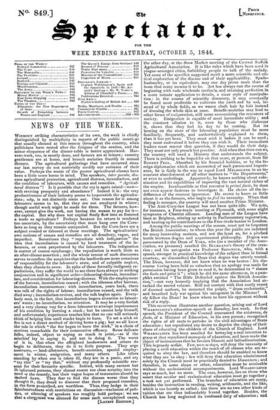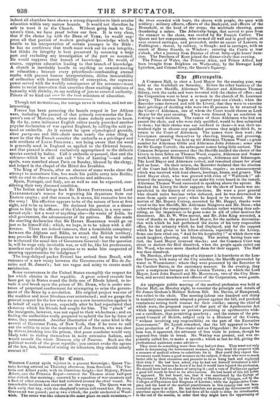NEWS OF THE WEEK.
WITHOUT striking characteristics of its own, the week is chiefly distinguished by multiplicity in reports of the public meetings that usually abound at this season throughout the country, when politicians have rested after the fatigues of the session, and the minor eloquence of the dinner-table is better appreciated. Har- vest-work, too, is mostly done, and farmers are at leisure; country gentlemen are at home, and branch societies fructify in annual dinners. The agricultural gatherings that have occurred since our last survey do not materially modify our estimate of their value. Perhaps the wants of the poorer agricultural classes have been a little more borne in mind. The speakers, inter pocula, dis- cuss agricultural protection, agricultural distress, incendiarism, and the condition of labourers, with causes and remedies. "Agricul- tural distress"! Is it possible that the cry is again raised—now- with reviving prosperity and abundance ? Indeed it is : the very productiveness of their industry seems to impoverish the agricultu- rists; why, is not distinctly made out. One reason for it among labourers seems to be, that they are not employed in winter; though useful work might be made for them. The farmers, how- ever, cannot give the work, not baying the means to pay for it— the capital. But why does not capital freely fit,* into so fostered trade as agriculture ? Perhaps because its return is rendered too uncertain, by the uncertainty that must hang over the Corn- laws so long as they remain unrepealed. But the Coro-laws are a subject evaded or tabooed at these meetings. The agriculturists' own notions of causes and remedies are all desultory, vague, and imperfect. Sometimes they "repudiate with indignation" the idea that incendiarism is caused by bard treatment of the la- bourers, or even perpetrated by the labourers. The indignation is matter of course surplusage ; the repudiation is worth little as an after-dinner assertion ; and the whole tenour of such discourses serves to confirm the suspicion that the landlords are more conscious of responsibility for the labourer's state, and of culpable neglect, than they choose to avow. In spite of these formally-indignant re- pudiations, they suffer the world to see three facts always in striking conjunction and in significant order—labouring-distress, incendiar- ism, and consideration for labouring-distress. With the employment of the harvest, incendiarism ceased ; with the idleness after harvest, incendiarism recommences : with incendiarism, years back, there was talk of the rights of labour; incendiarism ceased, and the talk died away ; incendiarism revives, and the talk begins again. Every- body sees, in the fact, that incendiarism begets attention to labour- ers' wants ; no incendiarism, no attention. It may be a very foolish and a very clumsy way for a farm-labourer to attempt improvement of his condition by burning a stack ; but he cannot help himself, and unfortunately experience teaches him that no one will seriously think of helping him until stacks begin to burn. To set a stick on fire is not a direct method of driving home a pig; but we all know the tale in which "the fire began to burn the stick," in a chain of motives remarkable for their consecutive efficacy. Some delicate folks, indeed, object to saying as much in print,—as if the mischief lay in saying it, and not in doing it. The worst of it is, that when the affrighted landowners and others do begin to deliberate, they do it to little purpose. They urge nostrums, — land-allotments, benefit-societies, special employ- ment in winter, emigration, and many others. Like idlers standing by when one is taken ill, they are in a panic, and cry ."try this " or "try that," without any profoundly scientific rea- sons for their favourite specific. Indeed, with many earnest but ill informed persons, they almost resent too close scrutiny into the need sr the remedy, lest their vague hopes of restoration should be dashed down. They fear to find the disease worse than they thought it, they dread to discover that their proposed remedies, an the form prescribed, are worthless. Thus, they hedge in their faintheartedness with restrictions on discussion—exclusion of poli- tics, or silencing of speakers too roughly bold perhaps: we see that a clergyman was silenced for some such unexplained cause, the other day, at the Stow Market meeting of the Central Suffolk Agricultural Association. It is like rules which have been used in plague-scourged cities, forbidding people to talk of the malady. Yet some of the specifics suggested merit a more scientific and cri- tical exploration of the disease and of their applicability. Spade- husbandry, or its equivalent, may one day prove more than the boon that many assume it to be. Art has always run the course of beginning with rude wholesale methods, and attaining perfection in a more minute application to details, a nicer style of manipula- tion: in the course of scientific discovery, it may eventually be found most profitable to cultivate the earth sod by sod, in- stead of by whole fields, as we weave cloth hair by hair instead of dressing the whole skin at once. Benefit-societies may lead to other forms of cooperation, still more economizing the resources of society. Emigration is capable of most immediate utility ; and the constant allusion to it, even by those who disfavour it, shows that they feel its day to be coming. But its bearing on the state of the labouring population must be more familiarly, frequently, and authoritatively explained to them, than it has yet been. They must wish it before it can be used ; they must understand it before they can wish it. Their immediate leaders must master that question, if they would do their duty. They must not only preach but practise. And when that time comes, the country will need a Ministry that understands the subject. There is nothing to be hoped for on that score, at present, from Sir ROBERT PEEL. Absorbed by his financial hobbies, or by the fo- reign diplomacies which are accounted of such paramount import- ance, he is fairly in the way to equal Lord MaLnourtsre in an in- souciant abandonment of all other matters to "the Departments," or even to underlings. Apparently, he knows nothing about colo- nization and its capabilities of improving the vast natural liches of the empire. Inexhaustible as that resource is prized facie, he does not even appear desirous to investigate it. He shows all the in- difference of the crassest ignorance. He seems to know as little about it as the farmers, who begin to feel its necessity. When that feeling is stronger, the country will need another Prime Minister.
The Anti-Corn-law League has not been quite idle. We note, for instance, a Free-trade meeting at Plymouth, with some slight symptoms of Chartist alliance. Leading men of the League have been at Brighton, stirring up activity in Parliamentary registration, and beating up for contributions to the Free-trade bazaar in London.
Among the public meetings of the season, must not be forgotten the British Association ; to whom this year the public are indebted for many interesting matters, and not the least so, for a pitched battle between dogma and experimental philosophy. Dogma was personated by the Dean of YORK, who (as a member of the Asso- ciation, we presume) assailed Dr. Buctu.sun's theory of the crea- tion; and his antagonist was Professor SEDGWICK, who, with a speech stronger in practical knowledge of the subject than in formal courtesy, so discomfited the Dean that dogma was utterly routed. The Dean, however, did not know when he was beaten : his dis- course having been held so valueless that an apology was made for permission having been given to read it, he determined to " shame the fools and print it"; which he did the same afternoon, in a pam- phlet entitled " The Bible Defended against the British Associa- tion,"—not very honestly implying that the Association had at- tacked the sacred volume. Still not content with that costly resort of damned authors, be mounted the pulpit, " drum ecclesiastic," and breathed holy war against his antagonist in the Minster! A sly fellow the Dean! he knew where to have his opponent without risk of a reply. This occurrence illustrates another question, arising out of Lord Wumusecirre's education-speech at Barnsley, last week. In that speech, the President of the Council announced the existence, de facto, of a Minister of Education, in his own person ; recognized the rights of all sects to partake in the civil advantages of State education ; but repudiated any desire to deprive the clergy of their share of educating the children of the Church of England. Lord WHARNCLIFFE has been assailed for betraying a real intention to grasp at that repudiated monopoly of education, and been made the object of insinuations that he favours Dissent and latitudinarianism. This is grossly unfair. Few, now-a-days, will deny the necessity of placing a civil education within the reach of all classes who are re- quired to obey the law, and therefore should be enabled to know what they are to obey : few will deny that education administered solely by the Church must be practically denied to Dissenters ; and therefore, in some shape or other, education must be attainable without the ecclesiastical accompaniments. Lord WHARNCLLFFE says as much, but no more. The onus, however, lies on those who assert that secular and ecclesiastical education must go together ; a task not yet performed. The branches of education are many, besides the instruction in reading, writing, arithmetic, and the like, which is too loosely so called ; but there are no two other kinds of tuition that are thus indissolubly bound together. Besides, the Church has long neglected its confessed duty of education ; and indeed all churches have shown a strong disposition to limit secular education within very narrow bounds. It would not therefore be safe to trust it to the Church. Without going back to G./1 MEG'S time, we have proof before our face. It is very clear, that if the choice lay with the Dean of Yortu, he would sup- press all that portion of modern geological knowledge which IS hostile to his interpretation of certain passages in the Bible : he has no confidence that truth must work out its own integrity, but thinks its integrity is best preserved by assuming a large part and excluding any investigation of the part so assumed. He would suppress that branch of knowledge. He would, of course, suppress education leading to that branch of knowledge. A church is inevitably hostile to anything so onward-moving as education ; because every priesthood—confounding eternal truths with present human interpretations, divine immutability of ordination with human fallibility of conception, the supreme power served with the worldly consequence of the servants—must desire to resist innovation that unsettles those exalting relations of humanity with divinity, to say nothing of jars to coveted authority. Priests of no kind can ever he the hest ministers of education.



























